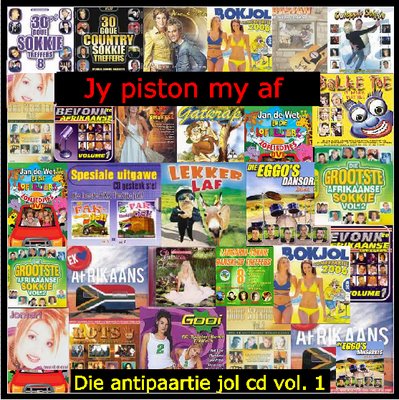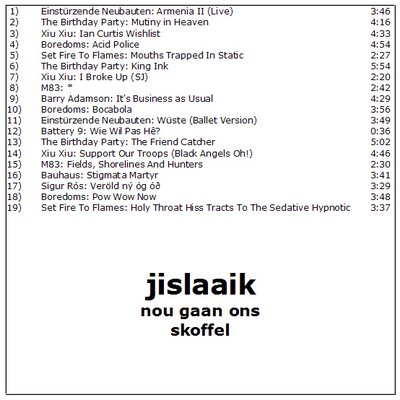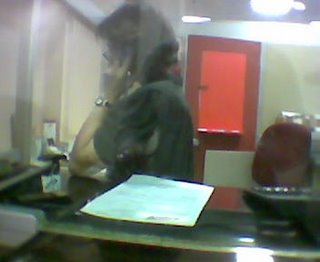What most of the readers of our blog probably already know is that, when I am not spending my time trying to become a better person, I am a lecturer at the largest Afrikaans university in the world.
The background to this post is Die Taaldebat [the language debate] and the precipatory event that caused me to write this piece was the
election of three taalbulle [pro-Afrikaans heavies] to the board of my university. One of whom is already starting to push his
views.
This post is not about the rhetoric of the taaldebat or even the language policy of the university (which has been criticized by the people now elected to the board). Instead, I want to show what the whole issue looks like from the perspective of a lecturer like me -- someone who not only likes the sound of his own voice, but who actually desires to be understood by his students.
The three faces of the language policy:
[The entire policy is available
here]
There is such a lot of misunderstanding about the options for language specification provided for in terms of the language policy of the university that I shall review the options quickly.
Undergraduate modules at our university are by default A-option. That means the language of instruction in these modules should be solely Afrikaans. With motivation, a particular module could have a different language specification – as either A&E or T – and this should be noted in the yearbook, so students know what they may expect.
A&E-specification denotes that the Afrikaans lectures are repeated in English - in other words Afrikaans AND English. Of course, lecturers are not paid for the extra lectures that they have to teach under this option and fitting those extra classes on the timetable is a nightmare. Consequently, one’s lectures sometimes end up in strange time-slots with low attendance figures. What is more, in my experience the vast majority of students do not choose the classes they attend in terms of the language of instruction. I had an A&E-specification module two years ago (before the whole debate acquired political significance) and I kept an attendance register with every lecture. Comparing the indicated first language on student records with the actual attendance record makes it very clear that most students seem to make their choice of which class to attend in terms of the timetable rather than in terms of language of instruction. Of course, it does not mean that language of instruction does not matter to these students, but it surely means that it does not matter as much as whether the lecture is at a convenient time. In that particular course one of the Afrikaans classes was at 08h00 on a Thursday morning; resulting in many Afrikaans students deciding to rather attend the repeated class in English at 12h00 the same morning. I rarely had more that fifteen students in that early class, compared with over a hundred attending the English class later in the morning. Therefore, if we ignore the ideological importance that the language debate has for the alumni of our university and approach it from a purely pedagogical angle -- then I am convinced that it is a non-debate for the majority of white Afrikaans students, as they possess the necessary second-language skill in English. The language of instruction in the classroom has a performance effect only for a small number of (mostly) non-white students. Unfortunately, these students are also the only ones for whom the small change has a massive outcome, because the majority of them are also in a precarious academic position well before they were required to attend lectures in their third language.
The third possibility is that a module has a T-specification. It means that Afrikaans and English are used interchangeably during the course, without the requirement that everything said in one language have to be repeated in the other. In other words, the lecturer must switch between languages with one proviso - at least 50% of instruction must be in Afrikaans. This is the option preferred by most lecturers such as myself. It is less work than the A&E option (it is not that lecturers are afraid to work, but like other people, they want to be paid for extra work). What is more, with the T-option, one can accommodate people and adjust to the requirements of the situation, and actually the T-option just formalizes the practice that existed in our faculty in response to the presence of students of other languages, long before there was a language policy or even a language debate. Because the 50%-rule is extremely hard for outsiders to monitor, this option affords the individual lecturer the most discretion and freedom – something valued by academics the world over.
There is not as much difference between the rigid A-specification and the laissez-faire T-option if one thinks about it. Lectures are only a small part of the total time a student spends engaged with the subject matter (at least that is the way it should be). Supposedly, the credit load of each module gives an indication of the amount of work that should be expected of a student outside the classroom on things like reading, studying, research, writing assignments, writing exams, etc. Naturally, there are limits on the freedom of a student to choose the language he/she can use for study outside of lecture times. In very few subject areas are handbooks and prescribed reading material available in Afrikaans. Therefore, an Afrikaans student spends a lot of time studying in English in any case. No doubt “taalstryders” will latch onto this as an example of why we should prefer the A-option in all of our classes. BUT actually it means that an Afrikaans student in a module with an A-specification (where all lectures are in Afrikaans), spends a mere 5-10% more time in Afrikaans than a student in a module with a T-specification (where only half of the lecture time is in Afrikaans). This makes it reasonable to go for the flexible T-option rather than the rigid A-option, enabling lecturers to respond to the local circumstances in their classes without really disadvantaging Afrikaans-speakers as much as people would like you to believe.
All of this assumes of course that the T-option is implemented to the letter and at least 50% of the lecture time is spent in Afrikaans. I am a great fan of minimum critical specifications and of our language options available, the T-option is the closest to that. Therefore, I am happy that (as of this year) all my modules are specified T-option, but a lecturer is still confronted with difficulties. Forget now the more fundamental questions of whether the university should promote Afrikaans or not, and look at the specific new problems that the language policy cannot address in the classroom.
My module and my conscience
In my module the prescribed book is in English, because it is the best handbook for this module and there have not been any academic publications in Afrikaans in this area in the last decade. Reasonable people would understand why I chose to prescribe an English book.
Then there is the question of the language of my PowerPoint slides. I know the subject area well enough that I do not need them to deliver my lectures, but I make PowerPoint summaries for my students, that way they can actually concentrate on my lecture and not worry too much about note-taking. However, because it is a major effort to make these PowerPoint slides and because they are intended to be summaries of the reading material, mine are in English only. Strictly speaking, this is breaking the 50% rule and I should make the slides in both languages. The irony is however that if I did not make any summaries at all, and just gave my lecture without any visual aids, then I would not be breaking the rule. Absurdly, if I made half the slideshow in Afrikaans and the other half in English, I would be applying the rule to the letter. What I did was to state this problem to my class and ask whether there would be any objection to summaries in English only and there were none. Of course it was unfair, because the alternative would be no PowerPoint summaries at all.
That leaves me with how to switch between Afrikaans and English while lecturing. So, let’s look at the stakeholders; the breakdown of my class according to first language is as follows: 35 Afrikaans, 17 English, 4 Zulu, 1 Xhosa, 1 Chinese.
But first language gives a poor picture; let’s rather think in terms of second-language ability. Nine of those 35 Afrikaans first language speakers are colored and although English is their second language, I am assuming that they are the set of students with the poorest ability in English. The four Zulu-speakers, the Xhosa speaker and the Chinese speaker have English as a second language and Afrikaans as a very distant third language. The remaining 27 white Afrikaans speakers have very good English school education (many of them matriculated with English as first language higher grade) and the 17 white English speakers have Afrikaans as a second language (and while they may speak it with a funny accent, they have little trouble following it).
What I want to illustrate here is that the way in which I choose to switch between Afrikaans and English during my lectures, have little consequence for the quality of communication with the 27 white Afrikaans speakers and the 17 white English speakers. However, the way I switch between languages has a profound effect on the quality of communication with the remaining 15 non-white students. The greatest deficiency of the T-option is that, as a lecturer I am constantly choosing between the interests of my colored students and my black students. I have to wait until the student feedback comes in to judge to what extent they were all happy with the way I made this choice, but I have bent the rules to accommodate as much English as possible during class. I reasoned that weighing nine English second-language speakers (of possibly doubtful ability) against six English second-language speakers (with little or no Afrikaans ability) is a no-brainer.
Still, I have some doubts about whether I should have done more to accommodate the coloured students. Strangely, although they are part of the group that I believe to be worst affected by the language policy, the colored students in my class are not political about it. I have kept a close watch on their class attendance and their performance in my tests. They are regular attendees and at least two of them are regular contributors in class and it seems like seven of them will pass my module (the other two might still make it, but it will be seat of the pants stuff if they do). So, I feel slightly less concerned about them.
Larger background compounded by the language-issueThere is some larger background to this as well. As if their language troubles are not enough, most of these colored and black students suffer from an insufficient educational background. So the two groups of students who can least afford not understanding what the lecturer says, are set against each other every time a lecturer switches language during the lecture.
It seems that people who matriculate with less than 70% avaerage, do not manage to get an average of 50% by the end of their first year at Stellenbosch. In other words, these people have to repeat some of their first year modules already. It indicates that there is a major disjuncture between what people score in their final school exam and what happens at university. This is however a trend at universities in SA in general, becase in our country there is a mismatch between the quality of secondary education and standards of tertiary education.
Of all the non-white students who study as undergraduates at our university, three out of ten scored somewhere between 60-70% in matric last year (and we can expect an average of around 40% at the end of their first year at university). In addition, four out of every ten non-white students at our university, scored somewhere between 50-60% in matric last year (and from them we can expect an average of just over 30% at the end of this year). You can see the problem: the language policy has its profoundest effect on seven out of every ten non-white students studying at our university, as they belong to the bracket of students who struggle to cope with the academic demands made at university.
I hope that I made clear why I do not care about the larger ideological “future of Afrikaans” part of the language debate. Instead, I am concerned about whether I am being understood by my students, especially those students who do not have the educational background to understand the prescribed book without my lectures. Moreover, as things stand now, I am constantly choosing between two sets of students whose future depends to an inordinately large extent upon my choice of language.
As might be expected, the language debate is blind to the matters that count for me as lecturer. It seems that being understood is not the issue and the language debate is going into a wholly different direction. Draw your own conclusions about why the debate is not concerned with the students who are most affected by it.
Still, those students are sitting in front of me and I need to make myself understood. I tell you, there is nothing as frustrating as a sea of blank faces – even if you like the sound of your own voice as much as I do…
*********
PS. I have just finished grading an essay assignment that this class had to submit. Students can choose whether to write their essays in English or Afrikaans. The choice is completely up to them and it is reasonable to assume that they would choose the language in which they feel most comfortable. Of the 55 assignments that were submitted, only six were written in Afrikaans (and all the colored students opted to write in English)...
*********
Lame disclaimer: This post is my personal view, which I only hold Wednesday nights after 10pm and weekends; naturally the moment I arrive at the office, I subscribe to the official view of my employer. No joke, even at university you are not always required to think ;-)

 PS: Most excellent albums of the week:
PS: Most excellent albums of the week:

